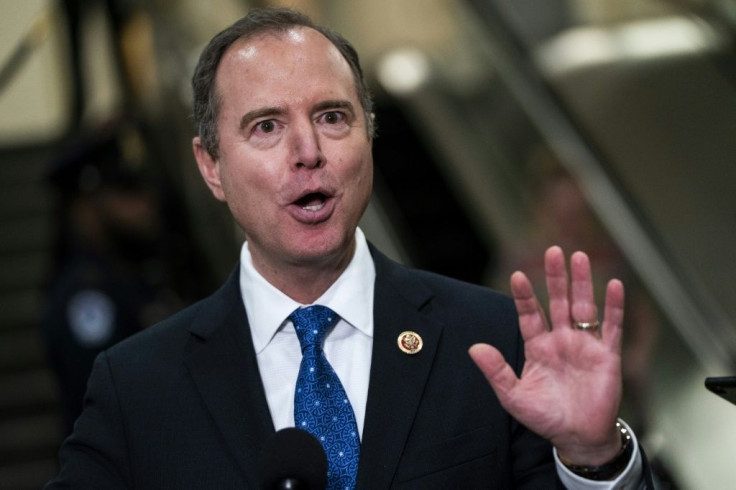Watch Trump Impeachment Trial Live Stream: Senators' Questions Approaching End

KEY POINTS
- Senators had 16 hours to ask questions and so far have used up nine
- The questioning gave Trump's legal team a chance to expand their argument to legalize any action by a president if he believes it's in the public interest
- After the question period ends, senators vote on whether to call any witnesses
Update: 4:45 p.m. EST
Rep. Adam Schiff, D-Calif., took offense at a question based on a newspaper story that “smeared” members of his staff and questioned their contact with the whistleblower whose complaint touched off the impeachment investigation.
The question submitted by the GOP read: "There are reports that the House Intel Committee hired a staffer who was overheard in 2017 speaking with someone alleged to be the whistleblower about taking down President Trump. Why did you hire this staffer the day after the July 25 Ukraine call?"
“Members of this body used to care about whistleblower identities. They didn’t used to attack committee staff,” he said, calling the question “disgraceful” and declining to “dignify” the allegations.
Jay Sekulow, one of President Trump’s attorneys, responded by again criticizing the process the House used to conduct its impeachment investigation.
Democratic Sens. Kyrsten Sinema of Arizona and Joe Manchin III of West Virginia and Republican Sens. Lisa Murkowski of Alaska and Susan Collins of Maine asked if the president could assure the public that "private citizens will not be directed to conduct American foreign policy or national security policy unless they have been specifically and formally designated by the president and the State Department to do so."
In response, White House deputy counsel Patrick Philbin denied Trump attorney Rudy Giuliani had been conducting foreign policy when he meddled in the U.S. relationship with Ukraine. But, he said, though he could not speak for the president, "in some circumstances" a president could rely on a "personal confidant" to carry out his policies.
Update: 1:20 p.m. EST
Sen. Rand Paul, R-Ky., tried to enter the name into the record Thursday of the whistleblower whose complaint about President Trump’s July 25 call with Ukraine President Volodymy Zelensky touched off the impeachment inquiry, but U.S. Supreme Court Justice John Roberts refused to read it.
“The presiding officer declines to read the question as submitted,” Roberts said after reading the question silently.
At the opening of the session, Senate Majority Leader Mitch McConnell, R-Ky., delivered a mild caution to Paul, directing senators to show deference to Roberts and his role as presiding officer.
Trump and his supports have clamored that the name of the whistleblower be made public despite federal law protecting the individual’s identity.
Update: 11:15 a.m. EST
Sen. Chris Van Hollen, D-Md., said he would introduce a resolution that would require U.S. Supreme Court Justice John Roberts to weigh in on the question of witnesses and empower him to determine what is considered relevent to the impeachment trial.
The Senate could overrule whatever the chief justice decides with a simple majority vote.
He said his plan would allow the Senate to get to the truth.
Update: 10:15 a.m. EST
The Hill reported U.S. Chief Justice John Roberts is leaning toward blocking a question about the whistleblower whose complaint touched off the impeachment inquiry in the House.
Paul's question is expected to name the individual, which would put Roberts in the position of outing the individual by reading the question aloud.
Original story
Senators get one more day to ask questions at President Trump’s impeachment trial Thursday before voting on whether to hear from witnesses and subpoena documents to determine whether the president’s decision to withhold military aid from Ukraine warrants removal from office.
The senators spent nine hours asking questions Wednesday, which gave Trump’s legal team the opportunity to offer its broadest defense of the president yet: Harvard law Professor Alan Dershowitz argued any favor a president seeks to improve his chances of reelection is justified if he feels his reelection is in the public interest.
Trump is accused of trying to leverage $391 million in military aid to Ukraine in exchange for an investigation into Vice President Joe Biden and his son Hunter’s involvement in the Ukraine energy company Burisma.
You can watch Thursday’s proceedings below, beginning at 1 p.m. EST.
Dershowitz argument was the most expansive yet, essentially saying, so what if he did it.
“Every public official that I know believes that his election is in the public interest,” Dershowitz said. “And if a president does something which he believes will help him get elected in the public interest, that cannot be the kind of quid pro quo that results in impeachment.”
The argument comes on the heels of revelations in a forthcoming book by former national security adviser John Bolton, who reportedly wrote Trump explicitly linked aid to Ukraine to investigations that could benefit him politically.
House impeachment manager Adam Schiff, D-Calif., said Trump’s attorneys have lowered the bar to the point “where everything’s OK as long as the president believes it’s in his reelection interest” – a standard that would have gotten Richard Nixon off the hook.
Republican leaders are trying to prevent further witness testimony though several moderate senators were thought to be on the fence. Democrats need at least four GOP senators to join them. A vote on witnesses would likely come Friday. If the Senate votes against calling witnesses, a quick vote could be taken on the articles of impeachment, ending the proceedings.
Senators are not expected to vote to remove Trump from office.
Bolton’s attorney pushed back at White House efforts to block publication of Bolton’s book by claiming it contains classified information.
“We do not believe that any of that information could reasonably be considered classified,” Cooper responded in an email released Wednesday. Bolton’s book was scheduled for publication March 17. Trump has tweeted Bolton’s book is “nasty and untrue.”
© Copyright IBTimes 2025. All rights reserved.






















